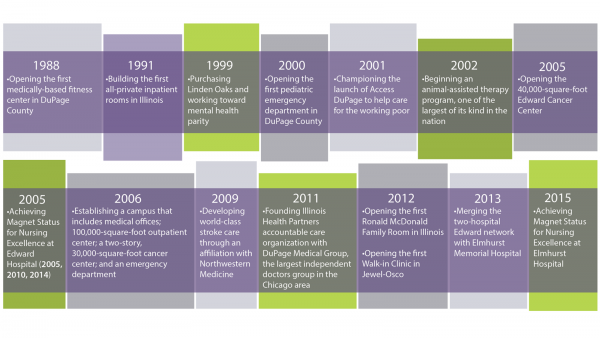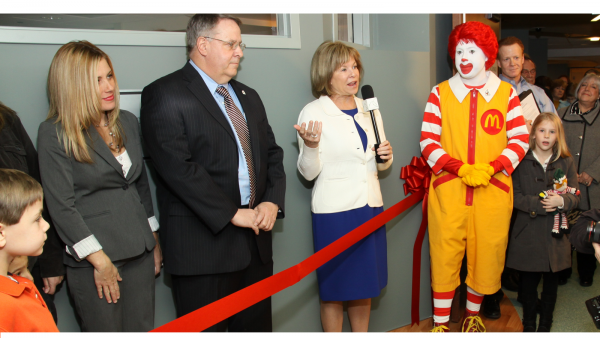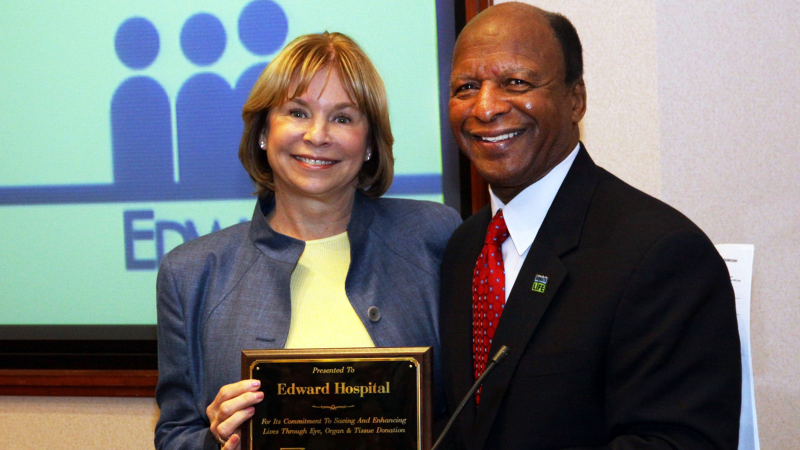After an Astounding 28 Years, our Friend Pam Davis Retires as the CEO of Edward Elmhurst. Meet the Woman Who Never Stops
In November of 2016, Pamela Davis announced her retirement from Edward-Elmhurst Health after a 28-year tenure as chief executive officer, one of the longest for a Chicago-area hospital’s top executive.
The Edward-Elmhurst Health system encompasses Edward Hospital, Elmhurst Hospital, and Linden Oaks Behavioral Health, with more than 100 outpatient locations across a service area of 1.7 million residents in the west and southwest suburbs of Chicago; 2,000 physicians on its medical staff; almost 8,500 employees; and revenue of $1.3 billion. This scope represents a very different picture than what Pam first encountered when she joined Edward Hospital as its CEO in 1988, however. Although she describes the hospital as having had an empty parking lot, an empty obstetrics unit, four-bed patient rooms, and outdated technology, she had a vision of it becoming the best provider in the region. “Young and impatient [with] lots of ideas,” she led the transformation of the small 162-bed community hospital into a 427-bed regional medical center that is the busiest hospital in DuPage County and is ranked among the most preferred hospitals in the state.
Pam was born and raised in west Chicago. Both of her parents were physicians, so she had early and frequent exposure to the healthcare environment through accompanying them on house calls and rounding. Although she was never drawn to the clinical side herself, she was intrigued by the operations and organization of the hospital, and decided at a young age that she wanted to become a hospital president. Pam drew inspiration from her mother’s example as she entered a world that was dominated by men; in fact, she was the only female in her graduate school class.
Pam’s first job was with Lutheran General Hospital in Park Ridge, where she served for two years as Assistant Administrator. She then went to Christ Hospital and Medical Center in Oak Lawn where she served for twelve years. At Christ Hospital, she progressed from Assistant Administrator to Associate Administrator, and then to Chief Operating Officer. Having this experience in major regional teaching hospitals prompted her desire to create the same strong environment at Edward. Although she had to work to convince physicians, administration, and the board to accept change, she is proud to have created a culture at Edward-Elmhurst that now values innovation.
Pam’s accomplishments along the way have included:

Pam is a Fellow of the American College of Healthcare Executives (and served as a delegate of the Section for Health Care Systems); a member of Regional Policy Board 5 for the American Hospital Association; an at-large trustee for the Illinois Hospital Association (where she served on the Transforming Illinois Healthcare Task Force); a board member for the DuPage Regional Development Alliance and Choose DuPage. She is a member of The Chicago Network, Naperville Responds for our Veterans, and was appointed City of Naperville Liquor Commissioner. She holds a bachelor’s degree in economics/social studies and a master’s degree in hospital and health services administration from the University of Iowa.
Pam has been honored by Chicago Health Executives Forum (CHEF), the largest independent chapter of the American College of Health Executives (ACHE), with its prestigious Career Achievement Award. She has also been named “Woman of the Year” by the local chapter of the American Association of University Women, and was previously honored by CHEF/ACHE with the 2015 Recognition Program Service Award and 2009 Healthcare Leadership Award. A more unique recognition, a sign for Pam Davis Drive was recently unveiled on the campus of Edward Hospital.

In 2003, when Pam and her team were in the planning process for the building of a hospital in Plainfield, she was encouraged by state officials to hire a construction firm that had no experience in building hospitals. Recognizing that unethical practices were afoot, she notified the FBI and agreed to help the agency uncover governmental corruption; along with Edward Hospital president and CEO Bill Kottmann, Pam wore a wire for eight months when attending meetings with the businessmen that were attempting to defraud the hospital industry. Their efforts uncovered a multimillion-dollar scam that led to the conviction of several political operatives including then-governor Rod Blagojevich, who was sentenced to a 14-year prison term. In addition to being recognized by the FBI, Pam was chosen by ABC World News as its “Person of the Week,” received the prestigious Naperville CAPS Public Service Award for exceptional service to the community, and was named the 2005 “Person of the Year” for Naperville by the Daily Herald.
You’re credited with exposing one of the biggest scandals in Illinois history. Other than what we already know from everything that’s been published, what’s your personal take on everything that happened?
The whole process was extremely difficult, but in the end, nineteen people were indicted. I knew I had done the right thing, and I was proud to do it. Part of the difficulty was that I couldn’t say anything. Even though people didn’t know the whole story or why I was making certain decisions, I had to keep going, because I believe I was on the right track. The truth of this – dealing with the FBI, ultimately, was very hard. I became close with some of the FBI guys I was working with, and when it was done I said, “It feels so good that maybe we made a difference.” And they explained that this was only one piece of it, and they had a lot more corruption to fight, but today we could chalk it up to a win. The thing I’ve learned is our leaders have to be ethical to set a good example because otherwise what we are teaching people is that the leaders think it’s okay, when it couldn’t be further from the truth.
So given everything that’s transpired, are you still glad that you were a part of this?
I would absolutely do it again. Hands down. What I think people have to realize is individuals make a difference. When everyone seemed to think everything was fine because they personally didn’t participate, and they didn’t do anything wrong, I called them out. “You saw it, and you didn’t do anything.” And I was not popular. They were all sitting back going, ‘Well, I was innocent.’ My response to that is, “I’m sorry, that isn’t good enough. It just is not good enough.” And if the world is going to work, individual people have to do something. I’m actually a little appalled that more people didn’t act.
During that time, given that you had to do so many things for so many different people, I’ve got to imagine it must have been difficult for you to run your organization.
The pressure was more that I couldn’t tell anybody what I was doing. I would go to various meetings and I knew I was going to just be crucified but nobody else knew it, I looked like I wasn’t doing my job. And I couldn’t say, “Look, I’m doing this for a reason; we’re following this trail of corruption.” Honestly, people started to come just for the show.
How did this all come about?
It was because we would’ve been spending $350 million on building a new hospital, and so when you start spending that kind of money, people go, “Oh, I can make money off that and nobody’ll notice.” So it’s where big dollars are in play, that’s where corruption seizes the opportunity.
So let’s shift gears a little bit and talk about your time at Edward – just under 30 years. Did you ever think of parting with the organization or did Edward Elmhurst always feel like home for you?
I did look at other opportunities but my heart was really embedded at Edward Hospital. I raised my kids here in Naperville. I didn’t want to pick them up and move them – would they have survived? Yes, absolutely. But I was working in Chicago and my husband was working in Chicago, and I didn’t think it was fair to just pick them up and move when there are 100 hospitals in the Chicago area; I thought if I can’t progress here, shame on me.
It’s rare to see tenure quite like yours.
I know. But we were growing and changing so rapidly that it was never the same thing, never boring, never – I felt like I was making a difference. And I lived here and felt proud to take care of people that I actually knew.
Roger has always said about Elmhurst, “People are very much about that hospital; it is not a job for them, it’s their mission…”
It’s fun, which sounds odd in health care. It’s serious business; I always say this is serious business; you have to take the business seriously. But ourselves? We have to take ourselves less seriously. It’s turned into a wonderful place where anyone would really want to work there. So that’s where you get the sense of feeling proud and joy, and if it can’t be happening there, there’s something wrong.
Looking back, what makes you most proud of your time at Edward Elmhurst?
It has been an incredible pleasure to work at Edward and then Edward-Elmhurst Health. I really don’t know how to say it any differently. I feel like we made an impact in an important field- really delivered excellent medical care like stroke and cancer, so people don’t have to go to Chicago. I do have an incredible sense of pride and I feel really fortunate that I could work for such a long time with incredible people and have them stay, as well as recruiting new people. It’s been a gift for me. It truly has.
Now that you’ve stepped away from Edward, Roger introduced you to Kelby Krabbenhoft, President and CEO of Sanford Health and you are doing bit of work with their international board in Munich- tell us about that.
I really love international work. I have been an international traveler much of my adult life. I think it is really important when you go to different places that you soon realize that people are the same everywhere. This makes you a much better world citizen. Everyone loves their children, everyone wants good health, and everyone wants the world to be a safe place. Recognizing this, it becomes obvious that every child is as important as every other, and the same for every adult. I am very proud of all the things that we have accomplished in America, but I think all of us have an immense responsibility to share our advances and to make the world a better place. I recognize that I am just one person, but I feel that each of us, if we can help one other person in our life, that is important and we should do it. The international board that I am currently working with, allows me the ability to continue trying to make the world a better place. The very positive element about Sanford Health is that sustainable healthcare is introduced to many developing countries. This is not about a hero running and doing 8 surgeries and leaving, rather Sanford goes in, trains people who will sustain the healthcare works that are established and insure that healthcare is there for the long haul. The international piece is complex, and I like that it is not an easy-in, easy-out quick fix.
In your world, how have you seen the healthcare transformation?
For a very long period of time, we have felt that we didn’t need to take responsibility for our own health. After all, the government or insurance companies paid our healthcare bills, and we could get everything that was needed and/or we wanted. People being curious creatures would say to their physicians, I would like to have a CT scan. I would like to experience an MRI procedure. The use of unnecessary testing costs a huge amount of money. If individuals are not responsible for paying people, and our physicians, while very well intentioned, try to please their patients, this results in unnecessary costs. Our insurance system was set-up to handle conditions that randomly effected individuals, be it cancer, heart disease or diabetes. What it has turned into now, is a system where we have a huge nation of people who think they don’t need to be responsible for their weight, their exercise regime, the food they eat, or the dangerous activities in which they participate. They believe they can smoke and there are no serious repercussions to them from the insurance world because the entire universe bears the burden and cost of that behavior. We have a society where many people have not had to check prices because it was not their responsibility to pay. As with most things, if you don’t have personal skin in the game, things become very laissez-faire. When we had younger people working and the older generation not living nearly as long as they do now, the taxation system was enough to pay for healthcare. Now we have people living way beyond what anyone ever thought when Medicare was established, and there are not enough young workers that support this without a tax system that would break their backs. We all need to make continual responsible changes in our own behaviors.
What do you think about the incredible consolidation between networks?
Some level of consolidation will provide efficiencies from back-office functions, group purchasing, call centers, etc. At what point, however, does a system become so big, that inefficiencies and the stifling of innovation begin to hinder the overall functioning of the system and the provision of healthcare. I think smart individuals want to make a difference in the work that they do, they want to be able to be nimble, and to meet the needs of individuals where they are, which sometimes on a local basis, is different than what is needed in a major metropolitan area. I do believe competition is good, and helps keep prices in check. I also think that too much standardization will force innovative individuals to choose alternative careers where their unique abilities will continue to thrive.
What do you believe young leaders need to know in order to be successful and to continue to move health care, as a whole, forward?
Young leaders will be reinventing themselves throughout their career. This has been and will continue to be the norm. There are many advantages with this mindset. Leaders need to reinforce continuous learning and continuous change. I believe it is essential for any leader to be incredibly transparent to share information and not to control it. By sharing information and sharing power, not hording it, you will engage many more leaders, and the end result is typically much better than the dictatorial approach. One of the elements that is going to be increasingly difficult for new leaders is the massive amount of information that is available. One must need the ability to sort through the huge amount of information, to call-out that which is important and actionable, and to develop plans to implement where the most good will be achieved.
Who are some of those professional mentors that you had throughout your career that have really made an impact?
My first job was at Lutheran General – a major tertiary teaching hospital in Park Ridge, Illinois. I entered my career as an Assistant Administrator. Keep in mind I was just out of graduate school and I entered the workforce in an area that new administrators would no longer be able to enter. One would typically do a year of internship in the hospital setting, and start at an entry level position to allow learning and development in their administrative attributes. I started my first day at Lutheran, and I was introduced to my Administrative Assistant. I had no idea what I was supposed to accomplish let alone what she was supposed to do to help me. There was a physician Jay Rosenbloom – who was an older internal medicine physician, how held an administrative role at the hospital. He was a bundle of energy, and was an incredible mentor to me. He would meet with me every day, and I would make rounds with him. He would allow me to sit through meetings, and then we would review the problems that needed to be solved, and those that needed to be dismissed. I didn’t have to pretend with him that I knew what I was doing, and he gave me some the best, humbling guidance as a young professional that I have been able to hold onto through the years, and I hope I have been able to impart this knowledge to other young administrators.
You have made a tremendous impact, not just with Edward Elmhurst, but the entire Illinois healthcare community. In fact, they named a street after you, right here in Naperville- that’s incredible!
It was so sweet. It’s actually right down Washington, and it was just so nice. Mostly I was so happy because my grandkids think it’s the coolest thing ever. It’s been my honor to have served the community of Naperville for as long as I have.


